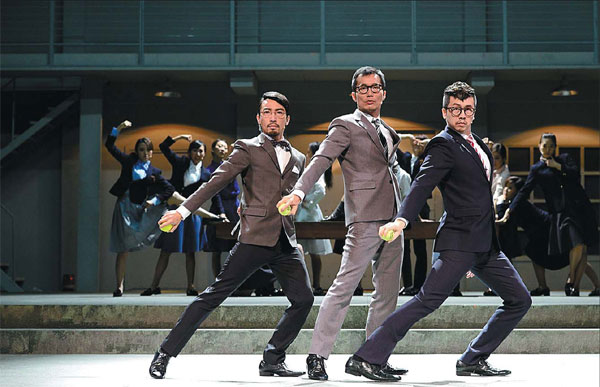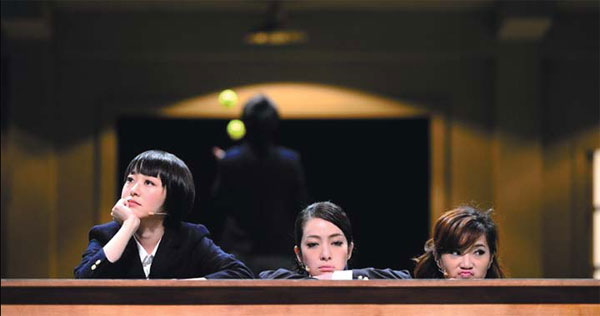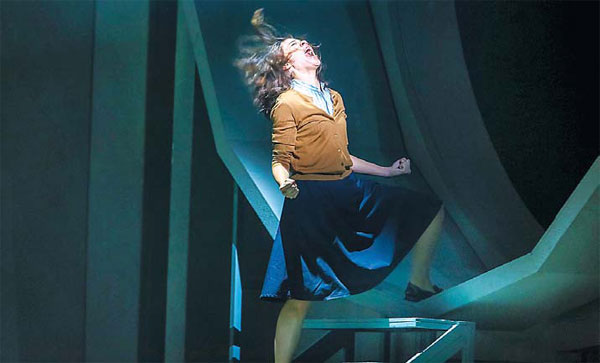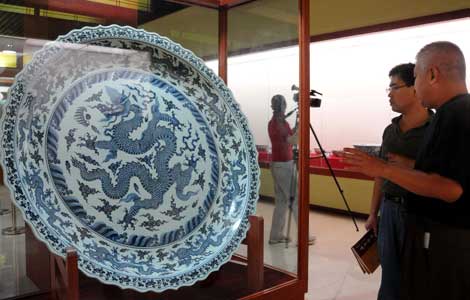A softer focus
Updated: 2013-08-02 07:28
By Xu Jingxi (China Daily)
|
||||||||
|
The theater adaptation of the Chinese classical novel Romance of the Three Kingdoms is set in a modern classroom and explores people's desire for success. Photos provided to China Daily |
|
Historical tales are reinterpreted in a way closely connected to modern-day society. |
|
Female performers are assigned to play male roles to showcase their vulnerability. |
Stage director takes a famous warriors' tale, Romance of the Three Kingdoms, and gives the roles to women, Xu Jingxi reports in Guangzhou.
Romance of the Three Kingdoms, a 14th-century novel based on the history of Three Kingdoms period (AD 220-280), has been regarded as a men's book. The main characters are the male warriors and strategists who battled in blood and brains seeking to rule over the whole country. Hong Kong stage director Edward Lam overturns people's stereotypes in his adaptation of the novel. The 13 main characters are played by actresses dressed in modern school uniforms. The scene is set in a classroom instead of the battlefield. Each of the play's 12 acts is a history lesson in which students put on a play to reinterpret the novel.
This is Lam's third production since 2006 that is adapted from China's Four Great Classical Novels. He thinks it's boring to reproduce the historical tales onstage with resplendent settings and ancient costumes.
"I assign a question to each play to connect these classical tales to today's society. Looking for answers, the audience will be easily drawn into the play and feel fulfilled after watching a show that is thought-provoking," Lam explains. 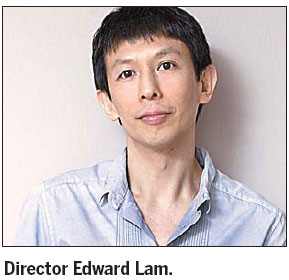
What is success? This is the question Lam has assigned to his latest adaptation. "People nowadays are desperate for success, which can be seen in the overflow of talent shows on TV. They seek attention to feel that they are important and successful," Lam says.
Tennis balls, the eye-catching fluorescent yellow and green props used throughout the play, are a metaphor for the center of attention, according to the director.
They replace many other props, such as the wine glasses for Liu Bei, the emperor of Shu state, and Cao Cao, the emperor of Wei state, when the two discuss the topic of heroes.
And it is a well-thought choreography that the actresses juggle tennis balls when delivering their lines.
"It's a success when you catch the ball(s). Then we need to see if it is a nice catch and if you are able to smile afterwards," says Yuri Ng, the choreographer.
Many people regard Romance of the Three Kingdoms as a guidebook to "catch a ball", or success. They analyze how to apply the tactics featured in the book to the workplace and interpersonal relationships.
However, in Lam's eyes, it is a book of lessons born from failure. "Many characters win in the battlefield but lose friends and freedoms," the director says. "The most important task for my writing is to find the tender spot," says the playwright Wong Wing-sze, who, as a woman, was not interested in the novel at first, stereotyping it as a book of men's wars. 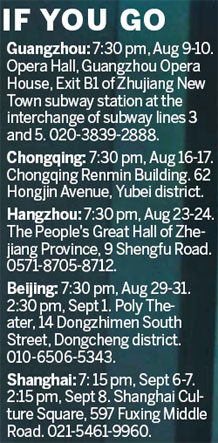
"Later I found that these men also have sentiments that are similar to women's, such as jealousy and hatred, which I can relate to."
While some people suggest it's just a gimmick to assign male roles to female performers, Taiwan writer Yang Chao stands behind Lam's decision because females are able to directly express their vulnerability.
For example, the two actresses who play the emperor Cao Cao and legendary doctor Hua Tuo present the most graceful, breathtaking arm wrestling. The movements are like dance, pulling, hugging and turning over on the table. The dialogue is also a wrestling contest, with Cao struggling between killing Hua and breaking down her defenses to love and care for a friend.
"It's difficult for men to bare their emotions deep in their hearts. It will look awkward if the scene is played by two men," Yang remarks.
Lam says the series of history lessons invites the audience to reflect on the challenges faced by any generation.
"The process of growing up is prolonged nowadays, with modern society's fast tempo pushing people going forward and leaving little time for them to learn about themselves," Lam says.
"With well-developed self-knowledge, you will establish your own definition of success so that you won't be bothered by not meeting other's expectations, which is an important sign of maturity."
Contact the writer at xujingxi@chinadaily.com.cn.
(China Daily USA 08/02/2013 page14)
Most Viewed
Editor's Picks

|

|

|

|

|

|
Today's Top News
Food program aims to address security
China faces world's worst managerial shortage
Soybean is king in American exports to China
China sails through 'first island chain'
US should reclaim 10% share
Chinese worry about image abroad
China blasts US Senate resolution
NSA chief details program at hackers' conference
US Weekly

|

|
